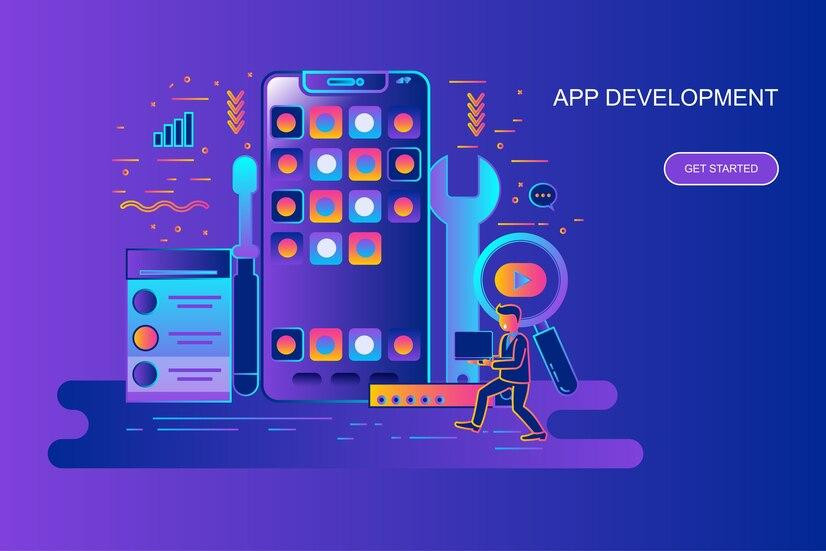Importance of mobile application development for businesses
In today's digital era, mobile applications have become an integral part of businesses across various industries. Mobile devices have revolutionized the way we interact with technology, making it crucial for businesses to have a strong presence in the mobile market.
Here are some key reasons why mobile application development is essential for businesses:
1. Increased customer engagement: A well-designed mobile application can provide a seamless and personalized user experience, leading to increased customer engagement and satisfaction. With features like push notifications, in-app messaging, and personalized content, businesses can effectively communicate with their customers and build long-lasting relationships.
2. Expanded market reach: The number of smartphone users worldwide is growing exponentially, and mobile applications offer businesses an opportunity to reach a wider audience. By making your products or services easily accessible through a mobile app, you can tap into new markets and attract customers who prefer mobile devices over traditional methods.
3. Competitive advantage: In a highly competitive business landscape, staying ahead of the competition is crucial. Having a well-developed mobile application can give your business a competitive edge by offering unique features, improved user experience, and enhanced functionality. It shows that your business is up-to-date with the latest technology trends and is committed to providing the best possible experience to its customers.
Mobile application development statistics
The mobile application industry has witnessed tremendous growth in recent years.
Let's take a look at some statistics that highlight the importance of mobile development Service:
1. App usage: According to a report by App Annie, users spend an average of 4.2 hours per day on mobile apps, surpassing the time spent on desktops and mobile web browsers. This indicates that mobile applications have become the preferred choice for accessing digital content and services.
2. Revenue generation: In 2020, global mobile app revenue reached $111 billion, with predictions of it reaching $935 billion by 2023. This shows the immense revenue potential that mobile applications offer businesses, making it a lucrative investment.
3. User expectations: Studies have shown that 79% of smartphone users have abandoned an app due to poor performance, while 88% of users are less likely to return to an app after a bad experience. These statistics emphasize the importance of developing high-quality and user-friendly mobile applications to meet customer expectations.
Key factors to consider before hiring a mobile application development service
Choosing the right mobile application development service is crucial for the success of your app.
Some key factors to consider before making a decision:
1. Expertise and experience: Look for a development service with a proven track record and expertise in developing mobile applications similar to your requirements. Check their portfolio, client testimonials, and case studies to assess their capabilities.
2. Technology stack: Ensure that the development service is proficient in the latest mobile app development technologies, frameworks, and programming languages. This ensures that your app is built using the most advanced and efficient tools available.
3. Customization and scalability: Your app should be tailored to your specific business needs and be scalable to accommodate future growth. Discuss your requirements with the development service and assess their ability to deliver a customized and scalable solution.
4. App maintenance and support: Mobile applications require regular updates, bug fixes, and maintenance to ensure smooth functioning. Inquire about the development service's post-launch support and maintenance services to ensure your app remains up-to-date and bug-free.
5. Cost and timeline: Consider your budget and timeline constraints when selecting a development service. While cost is an important factor, it should not be the sole determinant. Choose a service that offers a balance between cost-effectiveness and quality.
Steps involved in the mobile application development process
Mobile application development follows a systematic process to ensure the successful creation and deployment of an app.
Key steps involved in the mobile application development process:
1. Idea and concept development: This phase involves brainstorming ideas, identifying the target audience, and defining the app's purpose and features. Conduct market research and competitor analysis to understand the market demand and identify unique selling points for your app.
2. Wireframing and prototyping: Create a visual representation of the app's user interface and functionality through wireframes and prototypes. This helps in visualizing the app's flow and allows for early feedback and iterations.
3. Design and user interface (UI) development: In this phase, the app's visual design, color scheme, typography, and branding elements are finalized. The UI is developed to ensure a visually appealing and intuitive user experience.
4. Development and coding: The actual development of the app takes place in this phase. The development service utilizes programming languages, frameworks, and tools to build the app's functionality, integrate APIs, and ensure smooth performance across different devices and platforms.
5. Testing and quality assurance: Thorough testing is conducted to identify and fix any bugs, errors, or performance issues. This includes functional testing, usability testing, compatibility testing, and security testing to ensure the app meets the highest quality standards.
6. Deployment and launch: Once the app is tested and approved, it is deployed to the respective app stores (such as the Apple App Store or Google Play Store). The app is made available for download and use by the target audience.
7. Post-launch monitoring and updates: After the app is launched, continuous monitoring and analysis are essential to measure its performance, user engagement, and gather feedback. Regular updates and enhancements are made to address user feedback, fix bugs, and introduce new features.
Best practices for mobile application development
To ensure the success of your mobile application, it is important to follow best practices throughout the development process.
Here are some key best practices for mobile application development:
1. User-centric design: Focus on creating a user-friendly and intuitive interface that prioritizes the needs and preferences of your target audience. Conduct user research, usability testing, and gather feedback to continuously improve the user experience.
2. Performance optimization: Mobile applications should be optimized for speed and performance to deliver a seamless experience. Minimize load times, reduce app size, and optimize code to ensure fast and responsive performance.
3. Security and data protection: Mobile applications handle sensitive user data, making security a top priority. Implement robust security measures, such as encryption, secure authentication, and secure data storage, to protect user information and prevent data breaches.
4. Cross-platform compatibility: Consider developing a cross-platform app to reach a wider audience. Cross-platform frameworks like React Native and Flutter allow for the development of apps that work seamlessly on both iOS and Android platforms, reducing development time and costs.
5. Regular updates and maintenance: Mobile applications should be regularly updated with new features, bug fixes, and security patches. Stay up-to-date with the latest platform updates and user feedback to ensure your app remains relevant and performs optimally.
Popular mobile development frameworks and tools
Mobile application development frameworks and tools play a crucial role in streamlining the development process and enhancing productivity.
Some popular frameworks and tools used in mobile application development:
1. React Native: React Native is a widely-used open-source framework for building cross-platform mobile applications. It allows developers to write code once and deploy it on both iOS and Android platforms, saving time and effort.
2. Flutter: Flutter is an open-source UI toolkit developed by Google for building natively compiled applications for mobile, web, and desktop platforms. It enables rapid development, hot-reloading, and a rich set of pre-built UI components.
3. Xamarin: Xamarin is a Microsoft-owned framework that allows developers to build cross-platform mobile applications using C#. It provides a shared codebase, native performance, and access to platform-specific APIs.
4. Android Studio: Android Studio is the official Integrated Development Environment (IDE) for Android app development. It provides a comprehensive set of tools, emulators, and debugging capabilities to streamline the development process.
5. Xcode: Xcode is the official IDE for iOS app development. It offers a range of tools, simulators, and debugging features to simplify the development and testing of iOS applications.
Mobile application design and user experience (UX)
An aesthetically pleasing and user-friendly design is crucial for the success of a mobile application.
Key considerations for mobile application design and user experience:
1. Intuitive navigation: Ensure that the app's navigation is simple, intuitive, and consistent throughout. Users should be able to easily find their way around the app and access different features without confusion.
2. Responsive design: Mobile applications should be designed to adapt to different screen sizes and orientations. Responsive design ensures that the app looks and functions optimally on various devices, enhancing the user experience.
3. Visual appeal: Use visually appealing graphics, colors, and typography to create an engaging and visually stimulating interface. The design should align with your brand identity and create a positive impression on users.
4. Minimalism: Embrace a minimalist design approach to reduce clutter and enhance the app's usability. Focus on essential features and content, eliminating unnecessary elements that may distract or confuse users.
5. Usability testing: Conduct usability testing to gather feedback from real users and identify any usability issues or areas for improvement. User feedback is invaluable in refining the app's design and improving the overall user experience.
Testing and quality assurance in mobile application development
Thorough testing and quality assurance are crucial to ensure that your mobile application meets the highest standards of performance, functionality, and security.
Key testing practices in mobile application development:
1. Functional testing: Test the app's functionality to ensure that all features and functionalities work as intended. This includes testing user interactions, data input and output, navigation, and integration with external APIs or systems.
2. Usability testing: Conduct usability testing to evaluate the app's ease of use, intuitiveness, and overall user experience. Gather feedback from real users to identify any usability issues and make necessary improvements.
3. Compatibility testing: Test the app across different devices, screen sizes, operating systems, and network conditions to ensure compatibility and consistent performance. This includes testing on various devices, emulators, and real-world scenarios.
4. Performance testing: Assess the app's performance under different load conditions to ensure optimal speed, responsiveness, and stability. This includes testing for factors like load times, memory usage, battery consumption, and network performance.
5. Security testing: Conduct thorough security testing to identify and address any vulnerabilities or loopholes that may pose a risk to user data or the app's overall security. This includes testing for potential security threats, encryption, authentication, and data storage practices.
Conclusion: Choosing the right mobile application development service for your business
Mobile application development is a crucial investment for businesses looking to stay competitive and engage with their target audience effectively. By partnering with the right mobile application development service, you can transform your ideas into successful mobile applications that drive business growth.
Consider factors such as expertise, experience, technology stack, customization, and cost when choosing a development service. Follow best practices throughout the development process, and prioritize user-centric design, performance optimization, and security.
With the right mobile application development service and a well-designed and functional mobile app, you can leverage the vast potential of the mobile market and deliver an outstanding user experience that sets your business apart from the competition. Contact us today to get started on your journey to mobile success!
Contact us: 01204995996 / 8766267005
For more information please mail us: info@cybermatrixsolutions.com
Know more our services please visit here: https://cybermatrixsolutions.com/



Comments
Post a Comment